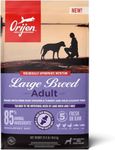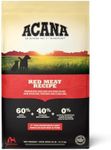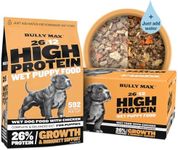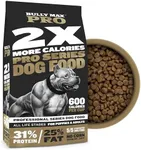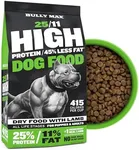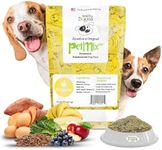Buying Guide for the Best Large Breed Dog Foods
Choosing the right food for your large breed dog is crucial for their health and well-being. Large breed dogs have unique nutritional needs that differ from smaller breeds, so it's important to select a food that supports their growth, maintains their weight, and promotes joint health. When evaluating different dog foods, consider the following key specifications to ensure you make the best choice for your furry friend.Protein ContentProtein is essential for muscle development and overall health. Large breed dogs require a higher protein content to support their larger muscle mass. Look for dog foods with a protein content of at least 20-30%. If your dog is very active or a working dog, you might need to aim for the higher end of this range. For less active dogs, a moderate protein content will suffice. Always ensure the protein source is high-quality, such as chicken, beef, or fish.
Fat ContentFat provides energy and supports skin and coat health. However, too much fat can lead to obesity, which is a common issue in large breed dogs. Aim for a fat content of around 8-15%. Active dogs may benefit from the higher end of this range, while less active dogs should stick to the lower end. Look for healthy fat sources like chicken fat or fish oil.
Calcium and Phosphorus LevelsCalcium and phosphorus are vital for bone development, especially in growing large breed puppies. The correct balance helps prevent skeletal issues. For puppies, look for a calcium to phosphorus ratio of about 1.2:1. For adult dogs, the ratio can be slightly lower. Always ensure the food meets the AAFCO (Association of American Feed Control Officials) standards for these minerals.
Glucosamine and ChondroitinThese supplements support joint health, which is particularly important for large breed dogs prone to joint issues like hip dysplasia. Foods containing glucosamine and chondroitin can help maintain joint function and reduce the risk of arthritis. If your dog is older or has a history of joint problems, prioritize foods with these ingredients.
Kibble SizeThe size of the kibble can affect how well your dog chews and digests their food. Large breed dogs benefit from larger kibble sizes, which encourage proper chewing and can help prevent choking. If your dog tends to gulp their food, larger kibble can slow them down and improve digestion.
Caloric DensityLarge breed dogs need a diet that provides enough calories to maintain their energy levels without leading to weight gain. Check the caloric density of the food, which is usually measured in kilocalories per cup. Active dogs may require higher caloric density, while less active dogs should have a lower caloric density to prevent obesity.
Fiber ContentFiber aids in digestion and helps maintain a healthy weight. Look for dog foods with a fiber content of around 3-5%. Higher fiber content can be beneficial for dogs that need to lose weight or have digestive issues. Ensure the fiber comes from quality sources like beet pulp or chicory root.

